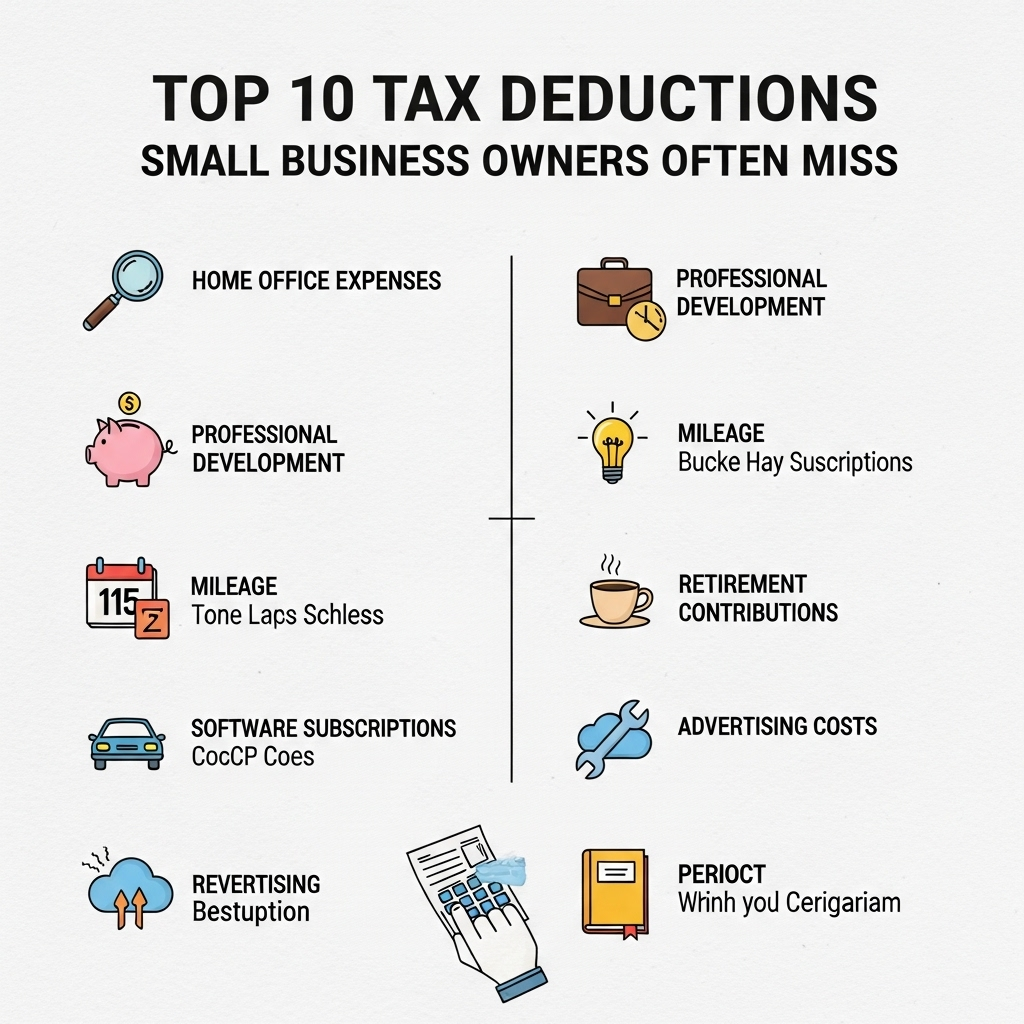Top 10 Tax Deductions Small Business Owners Often Miss
As a small business owner, you’re busy juggling sales, operations, and client relationships—tax planning might not always top your list. Yet missing key tax deductions could mean leaving thousands of dollars on the table each year. The good news: a combination of smart recordkeeping, tools like QuickBooks, and guidance from a fractional CFO can help you capture every deduction you deserve. Here’s an authoritative guide to the top 10 tax deductions small business owners frequently overlook, along with practical tips and QuickBooks examples to ensure nothing slips through the cracks.
1. Home Office Deduction
If you regularly use part of your home exclusively for business, you may qualify for the home office deduction. This can include a percentage of your rent or mortgage interest, utilities, and repairs.
QuickBooks Tip: Create a custom expense category for home office costs and tag related transactions for easy end-of-year reporting.
2. Business Mileage
Every business mile driven can add up to significant savings. Whether you’re visiting clients, picking up supplies, or attending networking events, mileage is deductible.
QuickBooks Example: Use the QuickBooks mobile app’s automatic mileage tracker to log trips in real time, distinguishing between business and personal travel with a swipe.
3. Startup Costs
New businesses can deduct up to $5,000 in startup costs and $5,000 in organizational costs in their first year. This includes expenses for market research, legal fees, and advertising incurred before you open your doors.
Actionable Advice: Log pre-opening expenses under a dedicated “Startup Costs” category in QuickBooks.
4. Professional Services
Fees paid to accountants, consultants, legal advisors, and yes, fractional CFOs, are fully deductible. Many owners neglect to track recurring or one-off advisory services.
QuickBooks Tip: Set up recurring expenses for monthly service retainers to ensure every payment is recorded.
5. Continuing Education and Training
Courses, seminars, and certifications directly related to your business are deductible. This includes online subscriptions, webinars, and industry conferences.
Example: If you buy a $400 online marketing course, categorize it under “Education & Training” in QuickBooks for precise documentation.
6. Bad Debts
If you’ve included income from a customer who later doesn’t pay, you may be able to write off the uncollected amount as a bad debt.
QuickBooks Advice: Use the “Write Off Invoice” feature to document non-payments for your records correctly.
7. Bank Fees and Interest
Service charges, credit card annual fees, and interest on business loans or credit cards are deductible, but often go unnoticed.
QuickBooks Example: Connect your bank accounts to QuickBooks. The software will automatically import and classify fees and interest for easy deduction.
8. Health Insurance Premiums
If you’re self-employed, premiums paid for your health insurance—and that of your spouse and dependents—may be deductible.
Actionable Step: Track all insurance payments in QuickBooks under a specific “Health Insurance” category to substantiate your claim.
9. Software and Subscriptions
Monthly fees for business software like QuickBooks, CRMs, design tools, and project management apps are fully deductible.
QuickBooks Tip: QuickBooks can automatically recognize and categorize recurring software subscriptions, making tax time a breeze.
10. Business Meals
While the rules have shifted, you can still deduct 50% of qualified business meal expenses. Meals with clients, employees, or at industry events are applicable, but lavish or personal meals are not.
Practical Example: Snap a picture of every business meal receipt using the QuickBooks mobile app. Attach these to each transaction for airtight documentation.
How a Fractional CFO Can Help You Maximize Deductions
A fractional CFO offers strategic oversight without the cost of a full-time hire. They can:
- Review your expense categories for missed deductions.
- Set up best practices in QuickBooks to automate expense tracking.
- Provide quarterly tax planning to minimize surprises.
- Train your team to capture receipts and document expenses correctly.
Don’t Leave Money on the Table
Small business tax deductions are only valuable if you claim them. QuickBooks automates much of the heavy lifting—categorizing expenses, tracking mileage, and organizing receipts—so you can focus on growth, not paperwork. Partnering with a fractional CFO ensures you’re not just compliant, but proactive in finding every possible deduction. Start leveraging these tips today, and keep more of your hard-earned revenue where it belongs: in your business.
Ready to Take Control of Your Business Finances?
Don’t let outdated beliefs or a lack of oversight put your business at risk. By combining innovative technology, sound legal structure, and expert financial guidance, you’ll build a compliance watchdog that protects your company and your peace of mind. The proper support means every expense is accounted for—no matter who’s making the purchase—and nothing ever “slips through.”
By investing in professional financial guidance, you’re not just preparing for a sale. You’re creating peace of mind, stability, and options for yourself and those who matter most.
Don’t wait for “someday.” Start building your sellable business today.
Like this article? Get in Touch!


